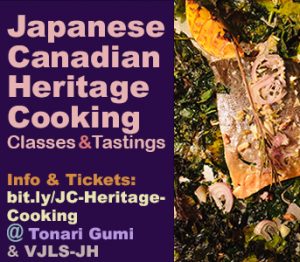Boats in the Harbour
The following essay was written by 19-year-old Carolyn Nakagawa of Coquitlam for a National History competition where it was first runner-up to the winning entry.
by Carolyn Nakagawa
“Where are you from?” the lady waiting at the bus stop in Surrey with me asks.
“Here. I’m from here. More or less. I’m a good hour by public transit away from Coquitlam, where I’ve lived all my life.” But I know she hasn’t asking me for my address.
“Oh.” There’s a pause. She is dark-skinned, older, in her fifties maybe, with shawls draped about her in a way that suggests something outside of conventional Western dress. “I thought you were immigrant, like me,” she adds. Her English is a bit slow, lacking confidence, most likely.
“Oh,” I say, apologetically.
Here is the thing again, the thing I can neither escape nor understand, towing along behind me like a clumsy tugboat that people can’t help but notice. There is other-ness in my face and features, thanks to my father’s Japanese roots. This woman is not the first to ask me. But looks are deceiving; I am not an outsider, I am born and bred Canadian. I cannot understand, or at least, could not understand.
That was a year and a half ago. I spent the last year studying in Japan, and one of the things I learned there was what it means to be foreign. It is an unshakeable self-consciousness with no intent of ever going away. And it drives a person, like all distinguishing human attributes, to seek others who are the same, even if only in that they are different from everyone else.
It is not fair to say what I experienced in Japan is the same as what new Canadian immigrants must feel. We have a much stronger immigrant culture, one with a goal of emphasizing multiculturalism and embracing newcomers. Even those of us who were born in Canada still claim ties to the nations of our ancestors, as Neil Bissoondath points out. Anyone who can trace their lineage will call themselves half-Swedish or one-quarter French. Only those who trace their ancestry back to the earliest settlers will, at a loss, despairingly say, “I’m just Canadian.”
My mother will tell people that her children’s ancestors are all “island people”– aside from my Japanese-Canadian grandmother, born in the harbour town of Steveston, my grandparents were all born on islands – Japan, England, and Newfoundland. Yes, I respond to her, but what is an island? If it’s only a mass of land surrounded by water, aren’t all the continents just very large islands themselves? Inversely, what is a Canadian? If family trees are traced back far enough, don’t we all come from other islands? First Nations people are the only exception that comes to mind, but even they are believed to have migrated from Asia. When should we draw the line—after a hundred years? A thousand?
Bissoondath discusses the difference between public and private identity—in Canada, we pride ourselves on the freedom and potential of our private identities. So much so, in fact, that the public identity remains grossly underdeveloped. We give the outsiders and the refugees a place to come as they are, to be who they want to be without the pressure that can accompany patriotism. But can they call this a home? Or is merely a safe harbor to dock their individual cultural ships? We float side by side, occasionally knocking against each other, anchored in place by our own separate ropes. We must find some common ground to disembark on, something beyond a mere location. We have so far only a limited and relatively recent history to unite us, a history we have refused to mythologize or gloss over. Is it really so surprising that we turn elsewhere, and that the elsewhere we turn is assembled by each person from the contents of her own tugboat?
As a young Canadian, the public identity I see being asserted by my government is our tradition of dual Anglo-French cooperation (and incooperation) with a colorful, tacky banner labeled “multiculturalism” plastered on top. A sad attempt at updating a not only problematic but also outdated foundation; the problem has gotten much more complicated with the offshoots of new not-so-minor minorities, such as the over one million Canadians who identified as Chinese in the 2001 census. The label of “multiculturalism” is without a doubt well-intentioned, but it comes off as almost condescending. “You eat tofu, just like a Japanese person!” “You’re wearing a sari, just as if that sort of thing belongs in Canada!” I thought it did belong in Canada, that poster seems to say so. I didn’t think eating tofu was strange, but maybe it is if it’s worth a comment.
In Singapore, people wear saris on the streets and subways—not just the odd person or two, either, but enough to say that it’s ordinary. Most signage and public business is conducted in English and Chinese, and the main religions are Buddhism, Islam, Christianity, and Hinduism. Admittedly I can’t see the issues of Singapore as clearly as my own country, but visiting there has led me to believe that true multiculturalism, or at least a truer multiculturalism, is possible. But how can we take this example and extend it beyond the boundaries of a tropical city-state? How can we transfer it to a country founded by white men who started to tax Chinese heads when their cheap labour was not as on demand as an ethnically “pure” Canada? Certainly, we have come a long way since then—but no matter where our country ends up going, we cannot escape the roots on which we were founded.
In our history we have a challenge even greater than that of our neighbors to the South—not “United We Stand”, but the outcome of both sides of a battle, the victors moving into uneasy coexistence with the defeated colonists. We have built a nation around the core of duality, a twisted and tenuous one which often threatens to split. And yet in the centuries since then, along with our various accomplishments as a nation we have grown into a multiplicity, new branches of immigrants seeding into our soil. The question is not so much how our identity will evolve in coming generations, but how has it already changed, and how can we acknowledge it? For there is a discrepancy, certainly, between the official Canadian identity and the reality. Growing up in Greater Vancouver, the language I heard spoken most often after English is probably Cantonese, and certainly not French.
“Canada is the result of boats, not birthright.” Naomi Klein argues that there is no essential “Canadianness” buried in our past; she is right. As a relatively new nation, the Canadianness we seek is in our present and future. While our current institutions cater to our history of duality, they must evolve to adapt to a world that doesn’t revolve around the Anglo-French debate.
Bissoondath describes the change going on in Quebec — the current generation of Quebecois as a people who “take their identity for granted, and get on with their lives”. It sounds like what needs to happen in the rest of Canada—we need to know that we are Canadian, but government-funded multiculturalism programs aren’t going to increase the meaning of this to us. We need to be able to take it for granted without denying it, while still understanding what it means. The Quebecois identity has undergone this transformation following a period of strong and sometimes radical nationalist sentiment—does Canada need to follow suit? A Quebecer, to avoid the “politics of division,” is anyone living in Quebec; a Canadian, then, should be anyone living in Canada. Perhaps a more accurate statement would be, a Canadian should be anyone who calls Canada home.
The question we are then led to is: who calls Canada home? This is enough to be Canadian, and it is not something to be downplayed by “but my grandparents were from Germany and Sweden.” When will we choose not the blood but the boats, the choice to come somewhere else made by our ancestors, or even our parents or ourselves? Indeed that says more than a simple happenstance of birth; and while multi-generational Canadians like myself have inevitably translated this into our own birthright, we must look upon more recent immigrants as the spiritual kin of our ancestors. There is the bond, no matter how ancient or recent; the fact of being an outsider, and seeking out a new home.
reprinted with permission of the Historica-Dominion Institute








